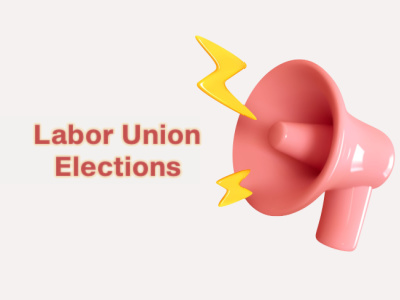In August 2023, the National Labor Relations Board (the “NLRB” or the “Board”) significantly changed its procedures when employees are seeking representation by a union.
First, the Board enacted its “Representation-Case Procedures” rule or “2023 Election Rule,” which, among other changes, expedites the timing of an election after a petition for election has been filed. The 2023 Election Rule took effect on December 26, 2023. As with many NLRB changes during the presidency of a different party from the last, this rule marks a return to the procedure created during the last Democrat administration in 2014 (effective in 2015), which had been changed during the prior Republican administration in 2019.
Consistent with the practice following major changes or decisions at the Board, on December 8, the NLRB’s General Counsel issued guidance regarding the new procedures – Memorandum GC 24-02. In it, recognizing the similarity between the 2023 Election Rule and the rule announced in 2014, GC Abruzzo wrote that parties can refer to a 2015 GC memo about the prior rule to gain “valuable guidance relevant to the 2023 Election Rule.” In addition, GC Abruzzo outlined the key components of the 2023 Election Rule, noting that it would “meaningfully reduce the time from petition filing to election and expedite the resolution of any post-election litigation, thereby achieving the goal of fairly, efficiently, and expeditiously resolving questions concerning representation.” As summarized in the memo, parties can expect that pre-election hearings will be held “approximately ten days sooner” under the 2023 Rule and that “only issues necessary to determine whether an election should be conducted will be litigated at a pre-election hearing” (largely eliminating pre-election hearings about individual issues, such as supervisory status). In addition, the 2023 Election Rule calls for regional offices of the NLRB, who oversee elections, to schedule elections on “the earliest date practicable” following a decision and direction of election, “rather than observing the 20-business-day waiting period” in effect prior to the 2023 Rule.
The changes to timing mean that elections will be held about three weeks earlier following a petition than they were from 2019-2023. Particularly in situations where employers were unaware of union organizing efforts before a petition was filed, the shortening of the campaign period, during which time employers can communicate with employees about the prospect of an organized workforce, is significant. In the first six months of 2023, under the non-expedited process, unions prevailed in over 80% of elections held. Many expect this number to increase under the 2023 Election Rule.
Second, the Board issued a decision in Cemex Construction Materials Pacific, LLC, 372 NLRB No. 130 (August 25, 2023), which announced a new process when a union or employees believe that a majority of employees wish to be represented. For the past 50 years, when a union felt that majority support existed (e.g., through the signing of representation cards), it could request that the employer voluntarily recognize and bargain with the union. If the employer refused to recognize (which it did in the vast majority of situations when confronted), the union would then need to file a petition for election with the NLRB. After Cemex, if an employer refuses to recognize and bargain with the union, it must affirmatively file an “RM” petition with the NLRB, triggering an election. If an employer fails to file this RM petition within two weeks of the demand for recognition, then the NLRB will order the employer to recognize the union and bargain unless the employer can successfully challenge majority support.
Further, for years, the NLRB has had the ability to order an employer to bargain with the union if the employer committed serious or “hallmark” violations of the National Labor Relations Act (the “Act”) in the pre-election period. In Cemex, the Board lowered the standard for misconduct, which might result in a bargaining order. Unlike the 2023 Election Rule, which reverted the election process to recent procedures, Cemex marks a sharp departure from current Board law.
Recognizing the significance of Cemex, the NLRB has dedicated a page on its website to the “Board’s Cemex Representation Framework,” complete with a Cemex Flowchart and, on November 2, GC Abruzzo issued a memo entitled Guidance in Response to Inquiries about the Board’s Decision in Cemex. In the memo, she agreed that “the Cemex Board advised that its new standard would likely result in finding an unlawful refusal to recognize and bargain based on fewer (even one) and less serious (non-“hallmark”) violations” of the Act. The memo stated that current Board law called for the setting aside of an election based on any violation, “unless the violations are so minimal or isolated that it is virtually impossible to conclude that the misconduct could have affected the election.” In the next sentence, it continued that the Board will “comport[] with its precedent related to setting aside elections based on conduct disruptive of the election process” and, in determining whether or not to issue an order to bargain, will “consider all relevant factors, including the number of violations, their severity, the extent of dissemination, the size of the unit, the closeness of the election (if one is held), the proximity of the misconduct to the election date, and the number of unit employees affected.” We have already seen the impact of Cemex. In May 2022, employees at I.N.S.A. Inc. requested that their employer recognize the United Food and Commercial Workers as their union. The employer refused; an election was held with the employees voting against representation. The UFCW filed unfair labor practices alleging certain unlawful conduct. In a decision issued in September, an administrative law judge, citing Cemex, set aside the election and ordered the employer to recognize and bargain with the union. That case is still on appeal.
Michael J. Passarella is a Partner at Olshan Frome Wolosky LLP in New York and heads its Employment Practice. He may be reached at mpassarella@olshanlaw.com.

